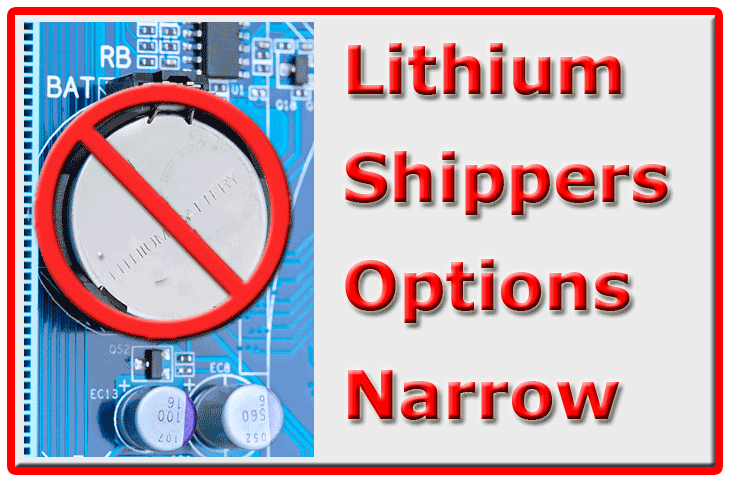
While
regulatory changes pertinent to the shipping of Lithium batteries are
winding their way through the regulatory process in the United Nations
(UN) and International Civil Aviation Organizations bureaucracy slowly
but surely, a sizable number of leading airlines have decided to take
matters into their own hands and take unilateral action by outlawing transportation
of Lithium batteries either partially or altogether.
Bans In The
Sky
UPS updated their policies effective April
1st, following a longtime FedEx policy requiring pre-approval of shippers
of Lithium commodities. FedEx additionally requires shippers’ training
records as well as proof that the batteries to be shipped have been successfully
tested in accordance with part III of sub-section 38.3 of the UN Manual
of Tests and Criteria.
The idea is to prevent shippers of counterfeit
batteries from using their services in a legit manner.
Qantas Airlines (QF), Delta Airlines (DL),
American Airlines (AA), Royal Brunei Airlines (BI), Cathay Pacific Airways
(CX), Emirates Airlines (EK), Etihad Airways (EY), Singapore Airlines
(SQ), Qatar Airways (QR), United Airlines (UA) as well as many others
have either banned the transport of batteries in total, or partially restricted
fully regulated batteries from carriage.
Others, including Lufthansa Cargo (LH),
for example, evaluate the shippers and their commodities and require further
assurances prior to accepting battery shipments.
It should be noted that such bans typically
do not affect batteries of either type installed in or packed with equipment.
Demands Ramped
Up
Increasingly unhappy with the relaxed regime
instituted, based in part on assurances by a Washington, DC-based lobby
group, The Rechargeable Battery Association (PRBA), and Arlington, Virginia-based
National Electrical Manufacturers Association (NEMA) that a requirement
for formal training would be unbearable for smaller shippers and that
excepted batteries installed in equipment pose virtually no risk, Cathay
Pacific (CX) is demanding that even where no more than four excepted cells
or two excepted batteries are installed in equipment, these shipments
are to be declared on the Air Waybill, and the Lithium battery handling
label applied.
So far, equipment containing no more than
four excepted cells or two excepted batteries may be shipped undeclared
in full accordance with the regulations.
FAA test shocked the industry
The drastic results of tests undertaken at the
FAA’s William J. Hughes Test Center in February 2014 drove ICAO
to ban the carriage of Lithium metal batteries (UN 3090) aboard passenger
aircraft, completely effective January 1st, 2015, even as discussions
continue toward development of further measures and restrictions.
Aircraft Manufacturer’s Speak Out
In the meantime, the International Coordination
Council of Aerospace Industry Associations (ICCAIA), which represents
aircraft manufacturers such as Airbus, Boeing, and Bombardier, has published
guidance materials calling into question the carriage of Lithium batteries
in its present form altogether, naming the threat of Lithium battery fires
an “unacceptable risk.”
In essence, the aircraft manufacturer’s
position is that the airframes of current aircraft are not designed to
withstand a Lithium battery fire, at least without further measures such
as fire-retardant covers, cargo units, or specific containers made from
intumescent materials, which obviously caught the airline watchdog and
interest group IATA cold.
The issue is further fueled by demands from
the pilot’s union, IFALPA, representing in excess of 100,000 pilots
worldwide joining the aircraft manufacturers in their call for action.
Going After
The Undeclared
Although it can be rightfully said IATA has been
late to the party, all of that seems in the past as discussions seem poised
to move ahead.
The presence of Lithium battery-related
issues outside the closed circles of the Dangerous Goods Community at
the IATA World Cargo Symposium earlier this year in Shanghai sent a clear
signal of engagement.
 IATA
Speaks Out IATA
Speaks Out
David Brennan, IATA’s Assistant Director
Special Cargoes, emphasized that IATA “will reach out and engage
with e-commerce sites to impress upon them the need to implement robust
checks and controls to limit the selling of dangerous goods other than
in accordance with the regulations.
“This needs to include clear and concise
information for both buyers and sellers about dangerous goods, specifically
lithium batteries,” Mr. Brennan stated.
“For governments we need to engage
to promote better oversight, surveillance, and enforcement of shippers.”
http://www.iata.org/publications/tracker/apr-2015/Pages/lithium-batteries.aspx
Now following initiatives of ICAO, UPU (Universal
Postal Union) and IATA, regulators are going after shippers of both counterfeit
and legit batteries shipped undeclared and moved by means of (air) mail
and courier, and users of auction platforms.
 Issues
& Battery Lobby Groups Issues
& Battery Lobby Groups
Even PRBA—usually quick in downplaying
issues and blaming incidents and accidents on non-compliance by a few
non-legit shippers—in a recent letter to ICAO's Secretary General,
admitted that “disregard” of regulatory requirements on the
side of some battery manufacturers and distributors “was both revealing
and worrisome.”
The letter, signed by PRBA’s Executive
Director, George Kerchner, said:
“Some who have their products shipped
out of Hong Kong continue to offer their batteries for transport without
complying with ICAO's dangerous goods requirements,” actually admitting
that "in many of these cases, circumstances suggest that they may
have knowingly violated ICAO requirements.“
Action Today
& Tomorrow
In a nutshell, the trust of airlines in
the assurances given by industry watchdogs and battery manufacturers are
now viewed with dubious distinction, so individual airlines are moving
ahead with total or partial bans on Lithium batteries. Interestingly,
some bans also include bulk shipments of rechargeable Lithium-Ion batteries,
which in the past were seen as not that much of an issue as Lithium-Metal
batteries.
Also, in the face of mounting reports about
accidents and incidents , stakeholders seem inclined to protect their
own interests in regard to possible claims of negligence on their side
should an accident occur—this clearly is the key motivation for
aircraft manufacturers as well as airlines to reduce risks which, they
feel, are hardly properly compensated.
Naïveté
a part of the problem
While it was oft stated that exemption from
formal training requirements applicable to shippers of ‘excepted‘
Lithium battery types was a necessary measure to protect small-and medium-sized
businesses, stakeholders were ‘surprised’ to learn that these
exemptions were mainly used by large-scale shippers who combined hundreds
of packages with ‘excepted’ batteries into overpacks and tendered
these to airlines.
Although some of these overpacks contain
thousands of batteries, the flight crew is usually not informed about
their presence by means of a NOTOC (Notification-To-Captain) or NOPIC
(Notification-To-Pilot-In-Command)—another thing many airlines have
changed now, and as of late a measure supported by IATA as a best industry
practice.
The point that “the overwhelming majority
of shippers are law-abiding,” as a recent ICAO working document
stated, may just be wishful thinking.
Regulators and training professionals have
long been cautioning against these exceptions of any relaxation of the
regulations.
The argument most often heard is that in
the rough and tumble world of commerce, shippers fight vigorously to achieve
cost reductions by fractions of cents and will use any opportunity to
cut down on expenses.
U.S. Regulators
Leading The Way
While U.S. regulators, namely FAA and U.S.
DOT-PHMSA, have drawn criticism from industry stakeholders, in particular
in regard to their approach to Lithium batteries (PRBA accused PHMSA of
‘regulatory overreach’ and ‘making no sense’ when
the initial version of HM-224F was published in 2010), the recent chain
of accidents and incidents seem to justify the conservative and safety-centered
approach initially taken by U.S. regulators.
In fact, despite claims to the contrary,
PHMSA, in a recent NPRM (HM-253), is tackling the issue of ‘reverse
logistics,’ something stakeholders worldwide so far have largely
ignored.
While shipments of consumer goods (including
Lithium batteries and devices containing these batteries) may be in full
compliance when shipped from the retailer to the consumer, compliance
is at least questionable when the consumer ships merchandise back for
reason of warranty repair, dissatisfaction, or any other notion. While
HM-253 covers transport via land vehicles only, it is at least addressing
an issue that is pressing worldwide, and not covered by regulations.
Can ICAO
DGP Help Sort Baseline Solutions?
ICAO’s Dangerous Goods Panel (DGP)
will decide on the motion of ICCAIA and IFALPA (Agenda Five) during their
meeting, taking place between this week between April 27th and May 1st
in Montreal; if approved, their decision would still require ratification
by the ICAO Council.
The Agenda Item 5 reads:
“Development of mitigating measures
to address risks associated with the transport of lithium batteries including
measures that address recommendations from the Second International Multidisciplinary
Lithium Battery Transport Coordination Meeting.”
The meeting is scheduled to address issues
in detail such as “bulk” shipments of excepted lithium batteries
and cells, performance-based provisions, limitation on state of charge,
simplified provisions, guidance material to assist States with oversight
and awareness programs, and miscellaneous lithium battery issues. It is
hoped it will help set forth clear and transparent guidelines for the
future.
Jens
|





